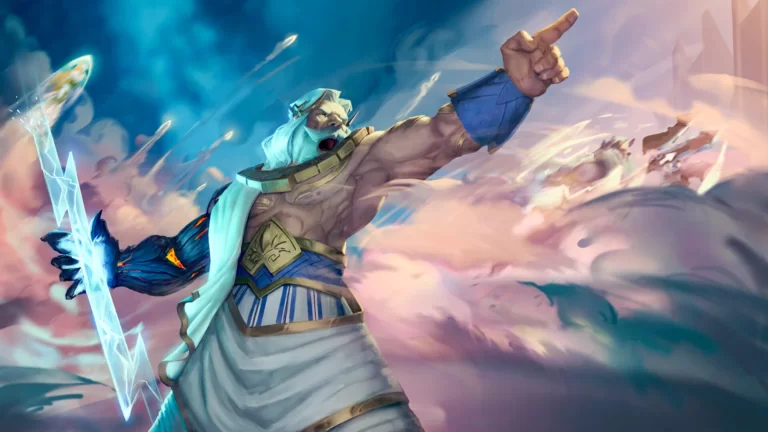The Olympian Gods and Goddesses
How many Olympian Gods and Goddesses are there? The number of Olympian Gods in Greek mythology varies based on the source, with some claiming twelve, others thirteen and still others even claiming sixteen Olympian Gods exist in the world of ancient Greece.
According to Greek mythology, the Olympian Gods are divided into two groups – The Twelve Olympians and The Hundred-Handed Ones (or Centimanes). Here we will be talking about both groups of Olympian Gods and their roles in Greek mythology as well as what their roles were in the Olympics.
However, only twelve are commonly referred to as Olympians, who live on Mount Olympus. These twelve gods consist of Zeus (father), Hera (mother), Poseidon (brother), Demeter (sister), Athena (god niece and goddess of wisdom), Apollo (god brother and god of music and arts, Artemis (goddessnieceand goddess of hunting and moon cycles), Ares (god son and god of war) Hermes (god son and messenger god), Hephaestus (god sonand craftsman god), Aphrodite (goddess daughter of Zues, who is fall in love with Mars a God). Hades (brother who is king of underworld) Persephone. At last gods decided to live on Mount Olympus where they could see all that happens on earth.
1) Zeus, the King of Olympus
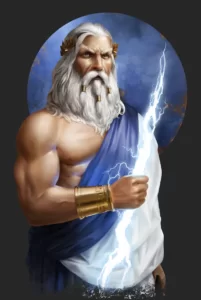
Zeus was revered as king and ruler of all gods. He possessed a lightning bolt as his most powerful weapon and had control over thunder, winds, clouds, rain, sleet and snow. His most famous feat was to defeat his father Cronus by castrating him with one single blow from a scythe.
It is also said that Zeus created humankind after first making them out of clay. He then breathed life into these statues in order to populate Earth. Another story says that he took an interest in a young woman named Io who was pursued by Hera, his jealous wife. To protect Io, Zeus transformed her into a white cow so she could escape Hera’s wrath.
However, Hera still managed to find her and turned her back into human form before capturing her again and imprisoning her on Mount Olympus where she remained until freed by Hermes. From then on she became known as Europa who gave birth to three sons: Minos, Rhadamanthus and Sarpedon who later became rulers of Crete, Rhodes and Lycia respectively.
2) Hera, Queen and Goddess
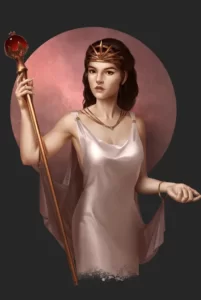
Hera is queen and goddess, beautiful and terrible. She is jealous and vengeful when she’s offended or betrayed, but she can also be kind. Hera was a jealous wife to Zeus (the leader of all gods), which makes her his enemy for life—and hers as well. She hates Aphrodite because she thinks Aphrodite took her rightful place: as Zeus’ favorite lover. Hera has children by three different fathers: Hephaestus (god of craftsmanship), Ares (god of war), and Hebe (goddess of youth).
She takes on many aspects in order to embody what each one needs most. For example, she is known as Athena when Hephaestus wants wisdom; Artemis when Ares wants purity; and Hestia when Hebe wants home. As Hera, she represents marriage, childbirth, family life and women’s rights. Her symbols are doves and peacocks. Her sacred animals are cows and mares; her tree is pear; her flower is violet; her gemstone is emerald; her season is winter; her day of worship is Saturday.
3) Poseidon, God of the Sea
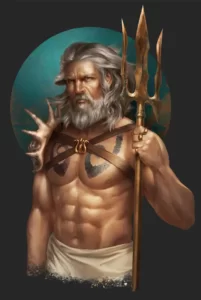
Poseidon was, without a doubt, god of all oceans. He held dominion over fish and sea monsters, and could create earthquakes with his trident. His sacred animal was an ox, and he often carried a dolphin or seal in his arms. Poseidon also received sacrifices made by sailors coming into port for safe travels across unknown waters.
On occasion, he would be accompanied by a horse named Arion. As god of horses, it makes sense that he’d ride one. It is believed that after Hippolytus was killed by Artemis’s own son, Althaea threw herself on his funeral pyre to join him in death. According to legend, it was Poseidon who calmed her enough to stop her from burning alive so she could pass on peacefully. Over time, Greek culture changed drastically and new gods were added to their mythology as people came into contact with other cultures and religions; but no matter how much they evolved, they still kept many aspects of their roots close to heart.
4) Apollo, God of the Sun
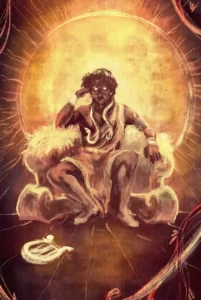
In Greek mythology, Apollo was worshiped as a god and considered to be one of the most important deities. As a member of that Olympian generation, he was considered to be part-god, part-man – and one of his jobs was guiding and teaching humans. Apollo is one of, if not, the most famous Olympian Gods. His father was Zeus and his mother was Leto. Apollo also had a twin sister named Artemis who he didn’t get along with very well.
Apollo was depicted as having a tall human body with two arms and legs, but he also had a sun for a head! On top of his head was an enormous corona which radiated light throughout all Greece. He represented healing medicine and music. Apollo seems to be one of gods who make everyone happy in ancient Greek mythology! Even though Apollo wasn’t liked by his sister, it doesn’t seem like anyone disliked him at all.
People loved him so much that they started building temples dedicated to him around 900 B.C.! They even made statues that looked just like him in order to show their appreciation for everything he did for them! People really seemed to appreciate what Apollo did for them and are still thankful today, 2200 years later…Even though many people don’t know about him today or care much about him, he is still seen as one of gods of ancient Greece (or any other civilization) because they appreciate everything that happened back then just as much as we do now.
5) Aphrodite, Goddess of Love

Aphrodite is known as both a goddess of love and desire. According to myth, her mother was Dione, while her father was Hephaestus. However, other stories list Aphrodite’s parents as Xynthia and Zeus, or Ares and Hermes. Even though Aphrodite was married to Hephaestus in Greek mythology, she had many affairs with other gods throughout her life. Zeus fell in love with Aphrodite at first sight.
He was so enamored by her beauty that he wanted to take her home immediately and make her his wife. However, knowing that his parents, Chronus and Rhea, would not be happy about it, he decided to hide Aphrodite in a cave on Mount Ida in Crete.
Once someone found him and asked what was wrong, Zeus revealed himself as a swan and told them who he really was. Eventually, they married and had two children: Eros (god of love) and Himeros (god of sexual desire). Aphrodite is also known for being very vain. She once made herself fall in love with a mortal man named Adonis after she saw how handsome he was. When she learned that Adonis had been killed by a wild boar while hunting, she begged Zeus to bring him back to life again. Zeus granted her wish but then killed Adonis when he grew bored of him. To honor their son, they created an annual festival called Adonia where everyone mourned his death by eating food mixed with seeds from pomegranate trees—the tree where Adonis died after being fatally wounded by a wild boar during a hunt.
6) Athena, Goddess of Wisdom
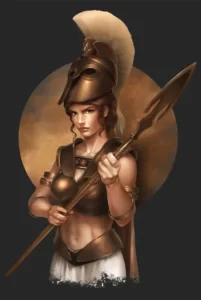
Athena was born full-grown and armored from Zeus’ head, with a mighty spear in her hand. She was patron of arts, science, and war. Athena’s wisdom was legendary, as well as her ability to strategize, create battle plans and show tactical thinking during wars. Homer describes Athena’s wisdom stating She knew more ways than one how to deliver men from harm.
Her wisdom has also been described by Nonnus in Dionysiaca who said that she knows the shifting tides of victory in war. Athena is often seen with an owl perched on her shoulder or taking its form. Although not limited to warriors and war, she gave special attention to those abilities valued among leaders such as generalship or statesmanship. Athena Nikephoros (Athena Victorious) was worshipped at Athens under various epithets.
As goddess of strategy and tactics, Athena was known for aiding both heroes and kings in time of conflict. She would appear in their dreams, suggesting what they should do to succeed. For example, she told King Leonidas I of Sparta before he went into battle against Xerxes I at Thermopylae that he would be victorious if he waited until Xerxes attacked him (see Battle of Thermopylae). Because it was thought that snakes shed their skin every year, they were sacred to her; therefore snakes appeared frequently on Athenian coins.
7) Ares, God of War
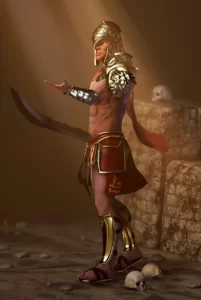
Ares is a Greek god that was worshipped for protection in battle. His Roman counterpart was Mars. Ares represents man’s tendencies towards violence and war, which can be attributed to his father being Zeus, whose family was known for their violent actions. He, along with Hephaestus, Athena and Hermes were born on Mount Olympus before any of the other gods could claim them as their own.
Ares claims Aphrodite as his wife while he fathers many children including Deimos (terror), Phobos (fear), Eris (discord) and Harmonia (peace). He is accompanied by two large dogs named Orthrus and Kerberos while wielding a large shield called Aegis which serves to protect him from any damage. In Greek mythology, it is said that Ares had a son named Askalaphos who lost a foot in battle.
It was later replaced with one made of bronze. In some myths, it is said that Ares would have an affair with Aphrodite where she would bear him three sons: Anteros (love returned), Hedylogos (revenge) and Hymenaios (marriage). To avoid Hera’s wrath, they were sent away immediately after birth to live far away from all civilization. Their names are only mentioned once during Homer’s Iliad when Agamemnon mentions how they will help lead Achilles into battle against Hector and his men.
8) Artemis, Goddess of Wild Things
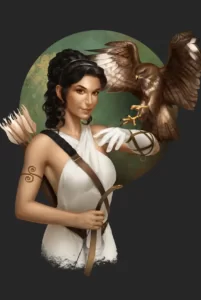
Artemis was one of Apollo’s twin sister and goddesses of hunting, wilderness, childbirth, virginity and plague. Artemis is known as a chaste goddess who never married. She frequently appears in Greek mythology as a huntress carrying a bow and arrows and accompanied by her hunting dogs.
She would often stay with Olympus for long periods at a time in order to keep away from men until one day she ended up falling in love with Orion; however he eventually died, accidentally killed by Hercules during a giant-killing contest. In another myth about Artemis, Orion fell for her but she rejected him because he had boasted that he could kill any animal on earth including her bear guardian.
He was then either turned into stone or killed after being hit by Zeus’s lighting bolt. To help ease his pain, Apollo sent his son Asclepius to heal him but once he was back on his feet again he continued pursuing Artemis. When she still refused him Asclepius shot an arrow between them which caused them both to fall madly in love with each other. She even let him follow her around until Hera found out about their relationship and persuaded Zeus to turn both of them into constellations; making it almost impossible for them to be together again.
9) Hephaestus, God of Fire and Blacksmiths
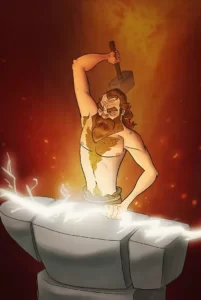
Hephaestus is god of fire and blacksmiths. He was known to be lame, which some say he got from his mother Hera when she flung him off Olympus because he was born with a physical deformity. Hephaestus created many items and weapons for other gods including Zeus’ thunderbolts, Achilles’ shield, Odysseus’ sword, and Helios’ chariot. His skill as a smith made him honored in Greek culture. Many Greeks believed that when they died their souls went to his forges in Tartarus where he created an afterlife for them.
He was associated with volcanoes because of their ability to create metal from molten rock. Ares, God of War: Ares is god of war. In mythology, Ares was often portrayed as being jealous and violent; however, he did show compassion towards his lover Aphrodite who had been caught in bed with another man by her husband Hephaestus. Some stories even suggest that Ares may have tried to kill Aphrodite’s husband out of jealousy; however, it was more likely done out of anger at how much Hephaestus loved his wife.
10) Hermes, Messenger God
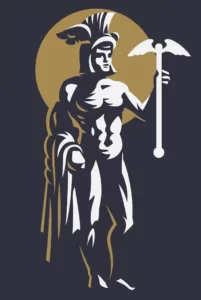
Hermes is a god in Greek mythology, son of Zeus and Maia, brother to Athena, Hephaestus, and Ares. Hermes was born on Mount Kyllini in Arcadia. He became a messenger for both gods and men with winged sandals and helmet. He is also known as Hermes Psychopompos (conductor of souls), an epithet reflecting his leading Chthonians to their new home after death; God of boundaries; God of commerce and theft.
His symbols are the tortoise, ram’s horns, bull’s horns and purse. His sacred animals are tortoises and roosters. As a patron of travelers he is associated with good luck, roads, gates, doorways, crossroads and borders. In literature he personifies eloquence and repartee. He leads newly dead souls to Hades’ realm using his golden rod or caduceus which has two snakes entwined around it.
11) Hedas, God of the Underworld
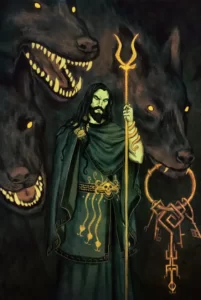
Hades was one of the 12 Olympians, the rulers of Ancient Greece and the underworld. He was also a son of Zeus, leader of the gods, and a queen named Rhea. Rhea hid her newborn son in a cave to protect him from his father’s brother, Poseidon. She made sure he had food delivered every day by Hermes until Hades grew up and started having an affair with a nymph named Persephone. They fell in love and married, but Zeus got angry when he found out that Hades kidnapped Persephone.
After many arguments between the brothers, they decided that Persephone could live six months on earth with her husband and six months with her mother or else she’d be forced to stay forever in the underworld. Write a professional post about Gods of Olympic – Hedas: In Greek mythology, Hedas is one of three judges who decide which souls go to Tartarus after death. His job is to weigh whether a soul is good enough for Elysium or not. If not, it goes straight down into Tartarus (the Greek version of hell). His counterpart is Keres and Aiakos.
12) Hestia, Goddess of the Hearth
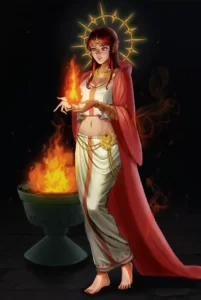
Hestia was the Goddess of the Hearth and Family, she was responsible for the domestic affairs of households, religion and morality. She also protected laws. She was portrayed as a young woman in red robe holding a pan of hot coals. Hestia gave her name to the month of August, which is named after her mother Juno. Her father was Cronus (Cronos) who ruled over the Titans and Hestia’s siblings included Poseidon, Zeus and Hades. It is said that she would leave Mt Olympus during battle in order to watch over her family when they were at home. In Greek mythology, Hera was Zeus’ wife and sister.
Their marriage is one of equals; both have strong personalities but are dependent on each other. In myth, Hera punished unfaithful wives with madness or death. She often dressed up as an animal to test Zeus’ virility. When he fathered Hercules with a mortal woman, she drove Hercules insane with jealousy by killing his children. To hide from Hera’s wrath, he had himself placed under guard while pregnant Alcmene gave birth to their son – little did he know that his wife had visited him disguised as an old lady who had offered him wine drugged with mandrake root!
Next Article: Prometheus God of Fire: A History of the Titan God of Fire
